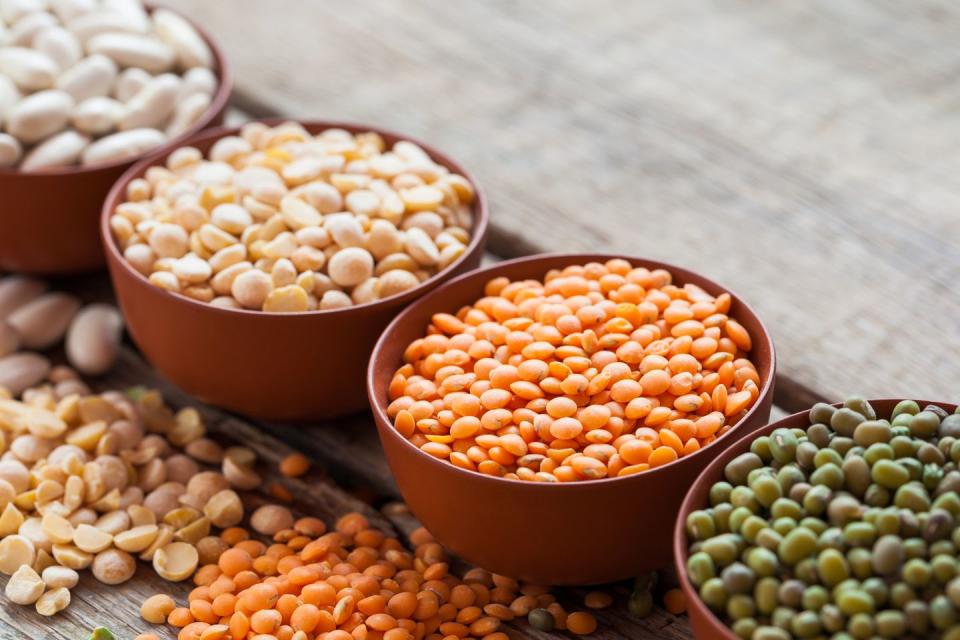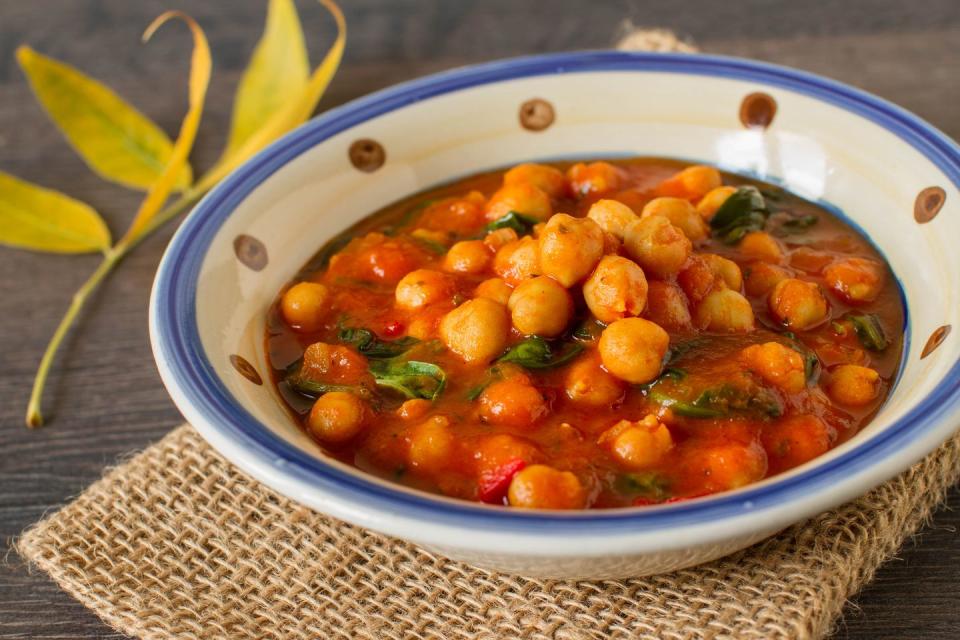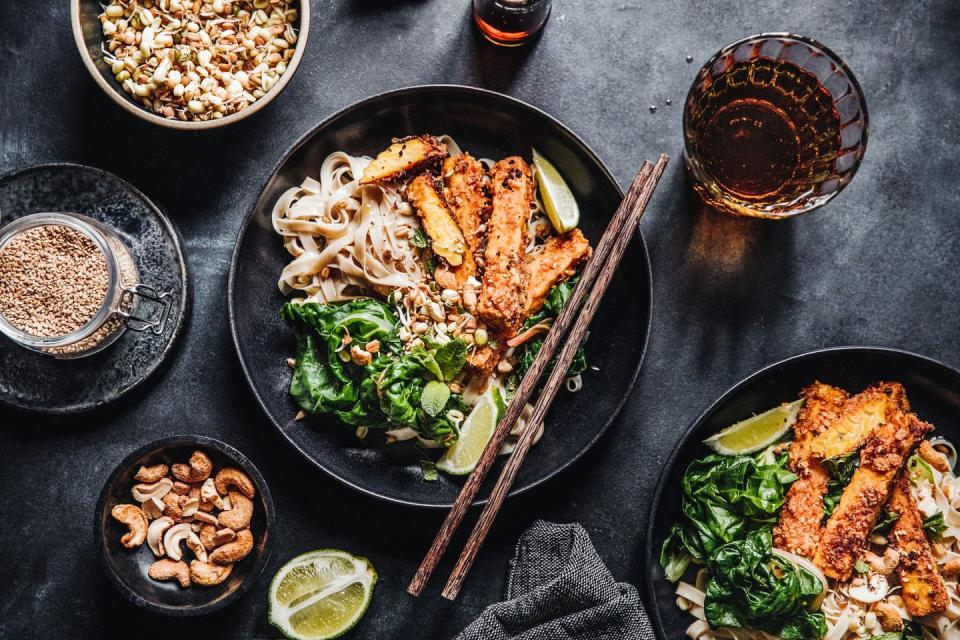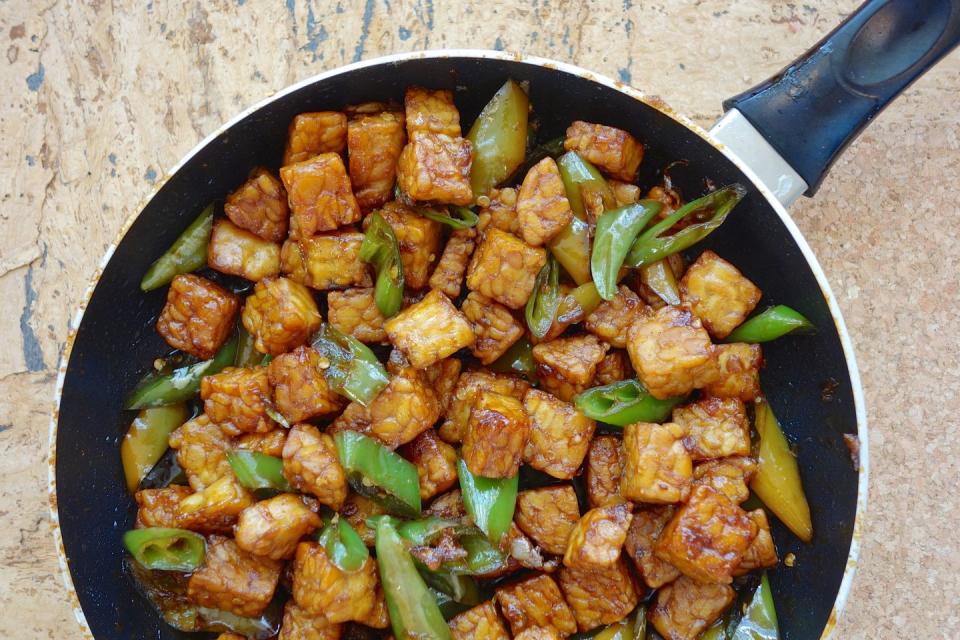The best vegan-friendly protein sources to add to your shopping list

One common myth surrounding a vegan diet is that you can't get enough protein to sustain a healthy lifestyle. But actually, it's easy to get the amount of protein you need per day... so long as you know where to find it! There's a stunning line up of vegan protein powder on the shelves if you need a little boost, but prioritising your protein through whole foods such as beans, lentils and vegetables is the best way forward.
Statistics from Viva! show that half of the UK population are cutting down on their intake of meat, with 3% of the public (around two million people) already identifying as being vegan. So, how do you confidently navigate getting the right amount of protein when following a vegan diet?
Author and Harley Street nutritionist Rhiannon Lambert, and nutritional therapist, health coach and plant-based chef, Linda North (who is also a member of the Plant Based Health Professionals), have all the advice you need on the best vegan-friendly foods packed full of protein.
How much protein should we be eating a day?
According to the UK Eatwell Guide, we need 0.75g of protein per kilo of body weight. This is usually around 45g per day for the average woman.
The best vegan protein sources
1. Beans and lentils
(Approx. 20g protein per 100g)
Swapping out the meat in dishes like chilli or stews for a plant-based alternative, like beans or lentils, is any easy dinner hack to get started with.
"Beans and lentils taste great in curries and soups and are also useful for thickening sauces or dips. They are an excellent source of fibre and some B vitamins," adds Lambert.
Meanwhile, North suggests, "A great way to enhance the bioavailability and nutritional value of beans is to ferment them, this is also known as tempeh. Soya is often used but any beans can work. Alternatively, you can sprout them, in the form of Ezekiel bread, which is made out of sprouted whole grains or legumes and contains approximately 8g of protein per bread."

2. Nuts and seeds
(Pumpkin seeds: 24.4g protein per 100g)
"Whether you are sprinkling them over porridge, throwing them into smoothies or snacking on them in the afternoon, nuts and seeds are a good source of plant-based protein," Lambert says. But that's not all they've got going for them: "They have the added benefit of containing fatty acids, calcium, zinc and selenium. Be creative and pack lots of different varieties into your diet."
Pumpkin seeds have more than the amount of protein found in many types of fish, such as cod (19g protein per 100g). Who would have thought?!
3. Chickpeas
(Approx. 7.7g protein per 100g)
Ah, a classic. You can put chickpeas in almost any meal, from curries and wraps to stir fries, and, yep, you can even use the leftover chickpea water (known as aquafaba) to make delicious deserts like mousse and meringue.
"Chickpeas are incredibly versatile as a protein source – they can be made into hummus, added to curries, blended into soups, roasted in a little olive oil and paprika for a healthy afternoon snack… the list goes on!" says Lambert, adding: "They also double up as a source of iron and fibre."

4. Soya foods
(Approx. 8g protein per 100g)
"Soya foods such as tofu provide an alternative plant-based protein source with a good amino acid profile, as well as fatty acids and calcium," advises Lambert. "Tofu can be a particularly tasty addition to Asian inspired curries, noodle dishes, and also when fried in a little soy sauce, oil and cornflour to become crispy. Try it out if you haven’t already!"
Don't forget that Edamame and soy beans are packed with lots of goodness too: 11g of protein per 100g.
5. Fruits and vegetables
(Approx. 2g-9g protein per cup)
"It might surprise you but all fruits and vegetables contain protein," says North. "Vegetables with the most protein include, green peas (9g per cup), broccoli, spinach, asparagus, artichokes, potatoes, sweet potatoes and Brussels sprouts, typically containing 5g of protein per cooked cup, or sweetcorn - even though it is classed as a grain."
And not forgetting our fruit friends, the expert adds, "we can look at guava, cherimoyas, mulberries, blackberries, nectarines and bananas with around 2-4g of protein per cup."
6. Seitan
(Approx. 75g protein per 100g)
The word might sound like the devil, but the food product is far from it – it's a very effective source of protein. "Seitan contains a high amount of protein and is made mainly from wheat gluten. Its meat-like texture means it's often found in curries and burgers," says Lambert.
7. Nut butter
(Approx. 20-30g protein per 100g)
"Nut butter on rice cakes or on toast works really well as a delicious and satisfying snack," suggets Lambert. Tbh there's no way it should be as healthy as it is, given how good it tastes.
"Nut butter is also great in smoothies and with fruit dipped into it (or just straight out of the jar, let’s be honest)! It contains healthy fats, although beware that some may contain added sugar; always check the label," warns the expert.

8. Tempeh
(Approx. 19g protein per 100g)
"Tempeh is an Indonesian plant-based protein source. It has a chewy texture not too dissimilar to meat and is a good addition to salads," explains Lambert. "It also has the added benefit of being fermented which may be beneficial for our gut microbiome." And well, anything your gut microbiome wants, it should get...

9. Algae
(Approx. 8g protein per 2 tablespoons)
This might not sound like the most mouth-watering option, but spirulina, for example, can be added to smoothies, juices, and salads.
"This is another great source of nutrients and vitamins needed by our body," adds North.
10. Wild rice
(Approx. 7g protein per cooked cup)
Apparently the type of rice you eat can make a difference. "Wild rice contains 1.5 times as much protein as brown rice or basmati, alongside healthy fibre, vitamins and minerals," says North.
11. Mushrooms and mycoprotein
(Approx. 15g protein per 100g)
North describes this one as her absolute "favourite", a type of fungus, often used to produce meat substitutes. Basically any Quorn product you can think of, which also contain fibre and a range of nutrients.
12. Meat substitutes eg. vegan sausages
(Approx. 8-20g protein per 100g)
Never dabbled in meat substitutes? Give them a try, says Lambert. "These types of products typically contain mycoprotein if Quorn based," she emphasises, but adds, "Other products such as Heck sausages contain lots of vegetables helping you towards your five a day. Some vegans cite missing the 'chewiness' of meat, therefore these products can be great alternatives."
Obviously some meat substitutes are more 'healthy' than others, so it's worth checking the nutrition contents.
You Might Also Like

